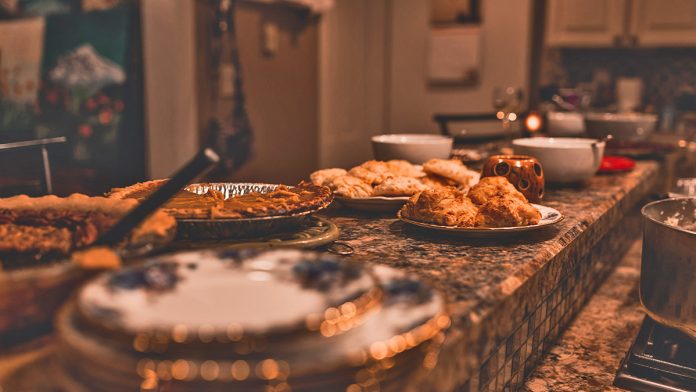As Alexander Nicholas grew up, his relationship with his parents became increasingly tumultuous as a result of his LGBTQ identity. In middle school, his parents indicated they wished it was just a phase when their child expressed interest in pursuing a queer relationship.
Being open with them during high school about identifying as queer created more friction, and the relationship with his family further eroded after Nicholas, a Queen Village resident, came out as trans last year.
“It was really hard to keep coming out to them over and over again about various things,” said Nicholas, 29, who identifies as bisexual, trans-masculine and gender-fluid. “Their idea of who I was was just way stronger than any new information I would bring them, and so it was always a constant battle,” he added.
Similar familial tensions are common in the LGBTQ community, which can make family-centered holidays like Thanksgiving challenging. This year, Nicholas is one of many out folks opting to spend the day with fellow queer people and “chosen family” instead of biological relatives. Inclusive holiday events take place across the city every year at Philadelphians’ homes and LGBTQ organizations alike.
“It’s just so much more relaxing … when you’re with people who you don’t have to explain things to, and there’s no hurdle of, ‘I need to validate my life choices and my identity,'” Nicholas explained, adding, “There’s no fear of, ‘If I try talking about this thing, will I get support or will I not get support and will being vulnerable in this moment backfire?”
Nicholas, a second-generation Filipino-American, will spend Nov. 28 at the Mantua home of Noel Ramirez, a board member of Philadelphia Asian & Queer, a volunteer social group for LGBTQ Asian Pacific Islander people. This is the sixth year Ramirez has hosted the event, dubbed Juicy Girl Thanksgiving, for queer folks, Philadelphia transplants unable to travel home for the holidays and other interested community residents.
A diverse group of about 12 people, including PAQ members and folks from Latin American and African nations, typically attends, said Ramirez. He encourages guests to bring “a dish from the heart” to contribute to the Thanksgiving meal. At previous iterations, attendees sung karaoke, watched the FX drama series “Pose” and did a macaroni-and-cheese cook-off.
Ramirez said he hopes the event creates a space where people don’t feel the need to compartmentalize their identities, and instead “feel loved, honored and respected” over a meal.
Most of the attendees “are largely folks of color who are queer, and so there’s a common understanding of the complexity of intersectionality and how family, in all the cultures that are involved is important,” he said. “And yet there is, for whatever reason, distance.”
“We spent most of our lives having to access resources outside of our families,” Ramirez added. “It’s just been something we always had to do to be whole in our identities.”
Ramirez’s parents, who he said were always largely accepting of his LGBTQ identity, will join the festivities this year. He said he hopes they can model what it looks like to be a supportive ally to queer children.
Kacey Wilson, a 32-year-old nonbinary person living in South Philadelphia, will spend Thanksgiving with their partner this year following a recent falling-out with their sister that concerned their gender identity.
Wilson has held LGBTQ Friendsgiving gatherings in past years, including a potluck that attracted more than 30 queer folks when they previously lived in Seattle.
“When I go to see my family for holidays, I have to be a different version of myself because there’s not a lot of full acceptance from certain family members, which kind of sucks compared to going and hanging out with your friends and … everyone can just be themselves and enjoy each other’s company,” they said.
When Wilson started coming out as a kid, they cut their hair, filled in their eyebrows and grew out their body hair. Their physical appearance and life choices always turned into a topic of conversation at family parties, they said, adding it only takes one negative comment from a family member “to set your whole emotional state in a different place.”
“That’s hard to deal with,” Wilson added. “Nobody should have to deal with that at a time that’s supposed to be about acceptance and love and togetherness.”
For queer Philadelphians without a place to go for Thanksgiving, local LGBTQ organizations like the William Way LGBT Community Center and Attic Youth Center host annual, free holiday meals.
The Attic will hold its Harvest Dinner on Nov. 26 from 4-6:30 p.m., while William Way’s event takes place Nov. 28 from 1-3 p.m. Those interested in William Way’s festivities, coordinated in partnership with the Mayor’s Office of LGBT Affairs, are asked to bring a dessert to share.
About 150 people are expected to attend, said Sandra Thompson, interim chief operating officer at William Way. Having a chosen family is especially important for LGBTQ folks who often are rejected from their families, she added.
“It’s important to give people an opportunity to share a meal with people they’re comfortable with, people that make them feel comfortable, that make them feel welcome,” Thompson told PGN. “Not everyone in our community is welcome at home, and not everyone in our community has someone or a group of someones with whom to have Thanksgiving dinner, so they may spend it alone. The idea is that people don’t spend it alone and that they don’t spend it depressed, but they feel a part of a community.”
Moving forward, Wilson said they hope to see the expectations change around Thanksgiving, making way for people to spend time with those who lift them up without scrutiny.
“[People] should just be more concerned about sharing space with loved ones and really making it about what this all means, which is that we have each other,” they added.

